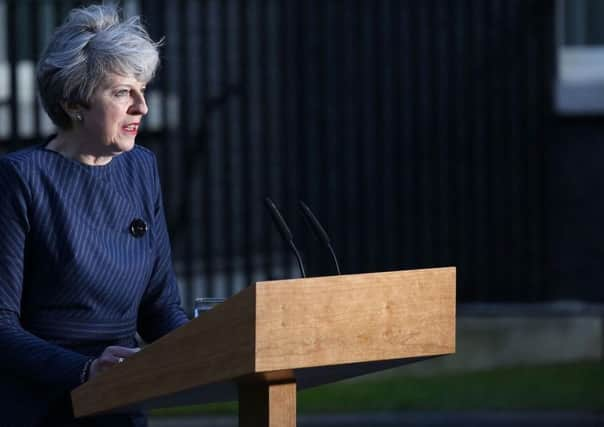YP Comment: Theresa May's calculated gamble as snap election called


Yet it is also a calculated gamble on the Prime Minister’s part. She realises, nine months after succeeding David Cameron, that she does, in fact, need a personal mandate to strengthen her Brexit negotiating position and neutralise looming political battles at Westminster, now that Article 50 has been triggered and signed into law – her number one objective until this emboldened move.
And while Mrs May’s strategy is not risk-free – there are never electoral certainties – the Tory leader believes, or has been persuaded by her Brexiteers, that an early election is the best way of securing the country’s long-term stability ahead of complex negotiations with the EU that have the potential to take far longer than the envisaged two years.
Advertisement
Hide AdAdvertisement
Hide AdHowever, while the Prime Minister cited the national interest for her volte-face, she will never have a better opportunity to secure a significant Commons majority thanks to Labour’s disarray under Jeremy Corbyn who is regarded by most as being unelectable.
Perversely, this poses one of the most significant challenges for Mrs May as MPs vote today to endorse the proposed June 8 election and effectively revoke the Fixed Term Parliament Act that the Tory and Lib Dem coalition introduced to prevent such eventualities.
Given she has prided herself on her trustworthiness, there is a risk that this shock announcement – there was no mention of the election on the Tory party website nearly an hour after Mrs May’s Downing Street announcement – that it is viewed as opportunistic, and an unnecessary distraction, primarily intended to maximise Labour’s embarrassment at a time when Mr Corbyn’s ratings are lower than those accrued by Michael Foot in 1983.
Mrs May needs to caution against this – or any premature self-indulgence on the part of her colleagues – given that there has been little discernible appetite on the public’s part for this poll. Despite her reputation for strong and steady leadership, gains made at Labour’s expense could be offset by losses to the resurgent Lib Dems, the last truly Europhile party standing across the UK, while support for a seemingly dysfunctional Ukip remains to be seen now the party has lost its core raison d’être.
Advertisement
Hide AdAdvertisement
Hide AdYet, while an election between Theresa May and Jeremy Corbyn does not appear to be a contest on paper when couched in terms of which individual is best qualified to lead the country, each party does, nevertheless, have a duty to satisfy three key tests – Brexit and the wider economy; national unity and Yorkshire’s best interests.
First, Brexit. This election should not be construed as a rerun of last year’s referendum. That is the past. This is the present and Mrs May’s move is an opportunity for each party to set out their negotiating priorities, and the type of country that they envisage, when Britain does leave the EU. It requires detailed plans about the nation’s finances at a time when key public services, like NHS and education, are being squeezed – a lingering legacy of the financial crash of nearly a decade ago. How will each of the leaders deliver the brand of ‘fairness’ that they espouse?
Next, national security, unity and constitutional matters. The main parties need to set out their vision for the whole of the United Kingdom – including Scotland where a second independence referendum is threatened and Northern Ireland which is in political limbo following the collapse of power-sharing agreements at Stormont. It’s also important that society’s divisions, cracks which came to the fore during the referendum, are not widened still further by divisive language. Tolerance of all is this country’s greatest virtue. Equally there’s the small matter of the House of Lords. If Mrs May wins, as she and most others assume, the Tories will still be bereft of a majority in the unelected Upper House.
Finally, Yorkshire. Despite promising to be a traditional One Nation leader that governs for all and not just the privileged few, Mrs May – or most of her senior ministers for that matter – have not visited this county since last July to listen to this region’s vews and concerns on infrastructure investment and other issues. The Tories can’t afford to take their support for granted here – voters have long memories and remember David Cameron and George Osborne promising major rail improvements in the 2015 election campaign before backtracking shortly afterwards. In the coming weeks, the public will expect better than this.
Advertisement
Hide AdAdvertisement
Hide AdThat said, this is Theresa May’s election to win, not least because of the residual goodwill that exists towards her. Unlike Gordon Brown who ducked an early election in 2007 and paid the price, she says she wants “to remove the risk of uncertainty and instability and continue to give the country the strong and stable leadership it demands”. It now falls to the Prime Minister to present her case to the country and show why this election is, as she stated, in the national interest. Let the people be the judge.